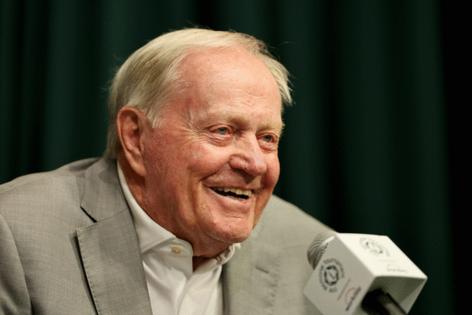Gerry Dulac: Despite winning four US Opens, Jack Nicklaus still calls Oakmont the most difficult of them all
Published in Golf
DUBLIN, Ohio — It might have been 63 years ago when he took his first remarkable step into the world of major championships, but Jack Nicklaus still recalls one memorable moment from his U.S. Open victory at Oakmont Country Club in 1962.
Aside from winning, of course.
At the driveable 17th hole on Sunday, Nicklaus hit his tee shot in the deep greenside bunker known as Big Mouth, played out to the fringe, hit a poor chip 5 feet above the hole and faced a "downhill slider that had to go in the hole or off the green" to save par.
Nicklaus made the putt, got into a playoff with Arnold Palmer, and history was about to unfold.
"Bobby Jones wrote me a note, and he said, 'I came right out of my chair when you hit that putt,' " Nicklaus said.
It was a memorable moment from a significant moment in golf history. And it happened at Oakmont, which Nicklaus facetiously recalled on Tuesday "is a spectacular place to win your first golf tournament."
It was the so-called "Changing of the Guard" the time the Golden Bear beat Palmer, the hometown hero, in an 18-hole Monday playoff in 1962. It was Nicklaus' first professional victory and the first of his record 18 major titles, and it came in Palmer's backyard.
Even though Palmer would go on to win two more majors — including the British Open one month later — the '62 U.S. Open was viewed as the moment the 22-year-old prodigy from Columbus supplanted the 32-year-old Latrobe, Pa., native as golf's dominant player.
That it took place at Oakmont made it even more special.
Nicklaus played in 44 U.S. Open championships, won four of them and still calls Oakmont the most difficult of all U.S. Open venues.
"I like Oakmont a lot," said Nicklaus, who is 85 and celebrating the 50th anniversary of his own tournament, the Memorial. "It's a very stern test, a tough test."
At the time, Nicklaus was not viewed with the same fondness he enjoys today, not in Western Pennsylvania, where Palmer was known as "The King."
Fans in the pro-Arnold gallery held up signs deriding the pudgy Nicklaus and calling him "Fat Jack." Among Nicklaus' supporters in the crowd was former Ohio State coach Woody Hayes, a family friend, who had to be restrained from getting into a fight with one of the hecklers.
But that animosity never existed among the playoff participants, even though it fostered one of golf's greatest rivalries.
"Arnold was very gracious," Nicklaus said. "He was the favorite. It was his hometown.
"I remember him coming over to me — there's a picture of Arnold walking over to me while we were warming up — and he said, 'Jack, you know, the purse today from the playoff gate goes to the champion, to the winner.' And he said, 'Would you like to split it?' I said, 'Arnold, that wouldn't be fair to you. I says, you know, I'm just here. I may play well, but I said, it's not fair to you.
"I said, 'We should probably just play for it' because I assumed that he would probably win."
Despite a bogey at the final hole, Nicklaus shot par-71 in the playoff and beat Palmer by three shots, becoming the first player since Bobby Jones to hold the U.S. Amateur and U.S. Open trophies at the same time.
His take of the gate: $1,400.
"Arnold couldn't have been nicer," Nicklaus said. "Yeah, I love Oakmont. I think it's a great place."
© 2025 the Pittsburgh Post-Gazette. Visit www.post-gazette.com. Distributed by Tribune Content Agency, LLC.







Comments